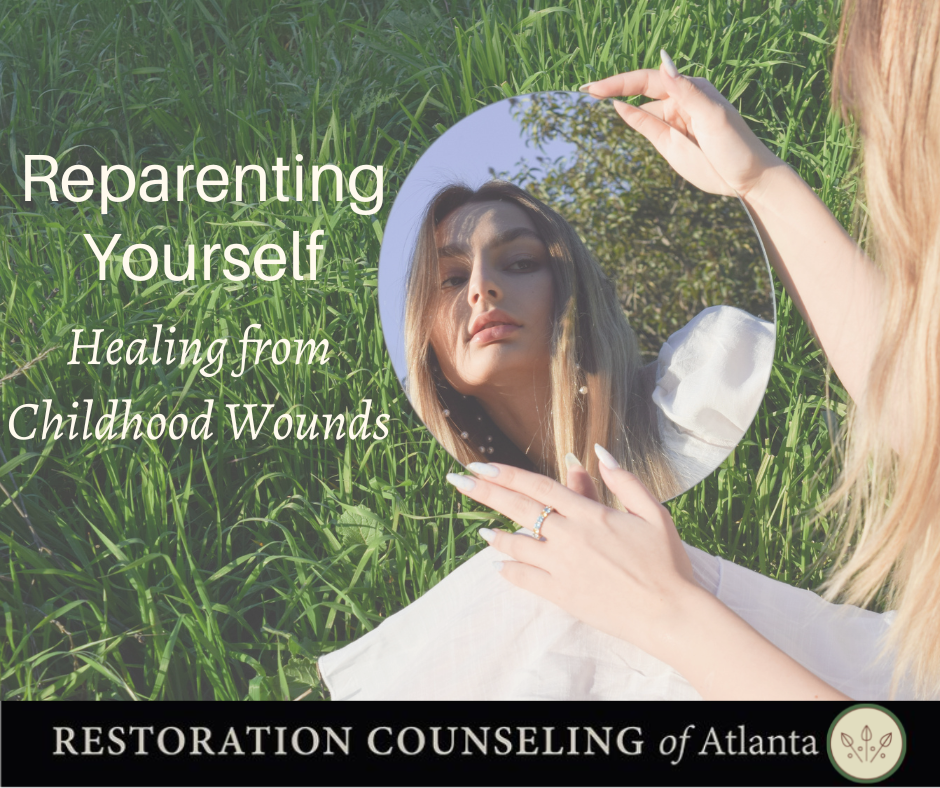Healing from Childhood Wounds so you can Parent in a Healthy Way
What does reparenting mean?
Often a person did not get their emotional needs of validation and acknowledgment met as a child. Instead, they were met with criticism, judgment, and shame. Reparenting is based on the idea that adults can reflect on their childhood and understand what they lacked. As an adult, they can then heal themselves through curiosity, validation, and affirmation. This will enable them to be better parents.
How do you know if you need to reparent yourself?
According to Dr. Becky from the foundation Good Inside, you might need to reparent yourself if:
- you struggle to set healthy boundaries and say no
- you feel selfish making time for self-care
- you have a very critical view of yourself
- you want to decrease being reactive
- you had childhood trauma you want to work through
Understanding Triggers
A trigger can be defined as an intense, strong emotional reaction to a stressful situation or event. Our bodies have a way of remembering what happened to us in the past. If you have ever been kicked or pushed, your body remembers what that felt like. It will naturally flinch when someone looks like they might do that to you again. Imagine someone saying to you, “I am going to punch you, but it won’t hurt, so stay still.” You would still flinch because your body remembers exactly what that felt like in the past. The same is true for any of our triggers. Our body remembers all of our past, even subconsciously. Looking at your past can help you be a more attuned parent.
No parent is perfectly attuned to their child all of the time. Children do not need perfect attunement to be securely attached to their parents, but they do need it about 1/3 of the time. It’s healthy for kids to see their parents make mistakes because “perfect” attunement will not prepare children for everyday life when they are adults. Repair is the most important part of the relationship because it allows a child to learn that it’s ok to make mistakes and grow from them.
How Reparenting Can Help
As a child, you may not have received the assurance that you needed from your parents, but you can give that to yourself now. It is especially important to do because our children have a way of triggering our trauma and childhood challenges. The reparenting process allows you, as an adult, to think about your childhood and understand yourself better. As a result, you will know what to give your children.
Children can activate within us needs that were not met when we were children. A parent who doesn’t understand will think that their child is just being annoying. Knowing that your child is not the enemy allows you to reframe the frustration and recognize it as an opportunity for you to grow and understand yourself better. It is crucial to understand what is happening because what a parent tells a child will eventually become their internal narrative and voice.
Anything that your child triggers in you is probably something that was part of your past. Allowing yourself to be curious and open about your pain will bring the healing that you need. When you, as a parent, look at your own insecurities and triggers, you will better know how to care for your child.
The Benefits of Reparenting
Reparenting allows the parent to focus on their behavior and triggers when they have a hard situation with a child. The parent often focuses on the child’s problem behavior and considers them the “problem.” However, a parent plays a role in the reaction as well. According to Dr. Becky, “Our feelings often get in the way of intervening effectively during difficult moments because we’re focused on shutting down uncomfortable emotions rather than focusing on what our child needs” (Good Inside).
Some parents were taught as a child that they needed to be rescued from their emotions or brought out of them. This does not help them when working with a child. Emotions are not something to be shut down. Nor is it helpful to simply solve the problem of the moment. These situations are meant to be felt and moved through. It is normal to experience uncomfortable emotions during the reparenting process; trying to tolerate the discomfort of those emotions will help you work through them.
How do you reparent yourself?
Reparenting starts with a desire for greater self-awareness and growth. Simply being curious about what you are feeling toward your child is important. Also, stepping back to understand your feelings can make a big difference. You can begin by setting regular daily check-ins with yourself to notice how you feel when you are activated in an interaction with your child. Being curious about your feelings instead of judging them will begin to make a difference. Emotions come from the Latin word emovere which means to “move out.” Our feelings are meant to move through our bodies, and they do that best when we accept them. Judging them only makes us more resistant to them and delays our actual healing. Consider making an appointment with Mead if you would like to talk more about reparenting.

by Mead Reed, MA, LMFT, LPC
mead@restorationcounselingatl.com, ext. 115
Roswell and Buckhead Locations
Mead’s therapy style emphasizes safety, connection, and engagement. Her disarming presence allows her clients to feel at ease as she helps them explore their life stories. She encourages clients to name their pain in a way that helps them to be able to bring healing and redemption.

